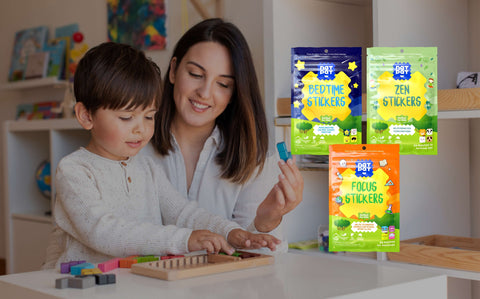Getting better sleep absolutely helps to improve our kids’ overall ability to function. Quality of sleep and how it can impact the following day is something that begins in our infancy and stays with us throughout our lives.
Without a good night's sleep, we will be prone to grogginess, tiredness, and a lack of focus throughout the day. While this is also true in adults, it is especially pronounced in infants, toddlers, and children.
Kids can already have some difficulties when it comes to focusing, so we need to work with all the tools in our arsenal to keep them alert and engaged. Helping them to get excellent, restful sleep is a holistic and incredibly effective way to set our kids up for success.
Getting good sleep is directly linked in kids to an increased performance at school and higher grades. Just laying in bed is not enough. Instead, the quality of sleep is just as important as the length of the rest.
For instance, if our kids lie down early but do not actually fall asleep for a prolonged period of time, that has the ability to significantly impact their performance the next day.
This is especially true in the case of certain subjects such as languages and math. That is because both of these topics require so-called “executive functions,” which are easily affected by not getting enough sleep. Our memory and ability to focus are directly linked to our quality of sleep.
How Do We Help Our Children Get Quality Rest?
Now that we know the many tangible benefits of helping our kids get better rest over the course of the night and how it can positively impact their days, it is time to establish exactly how to create their best sleep schedule.
Predictably, many of these tricks have to do with a regular bedtime routine specifically and the set of rituals and activities that lead up to it. However, there are also some important pieces of advice pertaining to the remainder of the day.
After all, the course of a day can easily alter our rest patterns, just like trouble sleeping at night can change your waking hours.
1. Give Them a Natural Sleep Aid
The first suggestion that we would like to highlight when it comes to improved rest in kids comes in the form of a helpful, effective, and all-natural sleep aid.
The SleepyPatch is a sticker that is 100% free of harsh chemicals or medication. Instead, they utilize the calming and intrinsic powers of essential oils to lull our kids to sleep. That's right—not even melatonin.
That said, while children certainly do love our sleep patches because of the fun designs on the stickers, they can be used by people of any age for a range of sleep needs. The precise blend of mandarin, lavender, sweet marjoram, and vetiver essential oils work splendidly in children and adults to help you fall asleep and then stay asleep.
Simply stick a SleepyPatch from The Natural Patch Co. onto your or your child’s shirt, being sure to tailor the exact spot depending on what position the recipient tends to sleep in.
2. Sleep Hygiene: Stick To a Routine
When it comes to kids, routines make them feel secure in a way that few other things can. As a result, it is best to stick to this established set of rituals whenever possible to reduce anxieties. This is especially true at bedtime since a child’s ability to fall asleep is inextricably linked to how safe they feel.
A consistent bedtime routine for kids is best when it lasts for a half an hour to an hour, leaning closer to the half-hour. If it lasts for too much longer than that, the child can begin to get groggy, lose interest, or become frustrated.
Of course, the exact timeline can change on nights where bathtime is part of the agenda and things come up that we cannot expect.
This bedtime routine should also consist of three to four activities such as helping them brush their teeth, reading them a story, singing them a lullaby, and giving them a healthy snack.
3. Help Them Relax
Different kids will find different rituals and activities to be soothing, so this step can really come down to knowing your own individual child and what makes them tick. Some kids may respond best to a softly sung lullaby, while others may enjoy cuddling a comforting object like a stuffed animal.
Really get to understand your child and what helps them wind down after a long and eventful day.
4. Read Them a Story
Other than lullaby-singing, reading our kids a story is by far one of the most famous and noteworthy methods of helping children enter that ever-illusive dreamland. Reading a story to our children stimulates their imaginations.
Perhaps the greatest benefit of all is that it provides a wonderful and memorable bonding experience for parents and children alike.
Whether you are reading them tales of far-off princesses, expeditions of great lands, stories from their favorite animated movies, or books that you treasure from your own childhood, this is a wonderful experience that is not to be missed.
5. Turn Off Any and All Screens Ahead of Time
Blue light from our electronic devices interrupts our circadian rhythms, meaning that they have the ability to confuse our minds as to what time it is. Instinctually, we want to sleep when it is dark and be awake while it’s light.
Looking at blue light at night can trick our brains into thinking it is actually daytime aka wake-up time, making it more difficult to go to sleep naturally.
It is true that some screens have a blue light limiting or blocking option, and this is a good route to pursue when beginning to wind down for the night. That said, it is still best for our whole family (adults included) to avoid screen time for an hour before bed. This gives us enough time to reset and unwind, letting us know that sleep is near.
This applies to a variety of screens, including but not limited to:
- Smartphones
- Television
- iPads and other tablets
- Video game consoles
- Computer/laptop screens
6. Make Their Space Nice and Cozy
As mentioned before, for a child to fall asleep, they have to feel totally safe and secure. A great way to ensure this is to make their room as comfortable of a sanctuary as possible. Include their favorite toys, blankets, and pillows.
Be sure to turn out all the lights before bed, but kids who need a bit of assurance in the dark may benefit from a nightlight.
7. Spend Plenty of Time With Them: Quality Comfort
Another one of the most common reasons that kids may not get to bed on time is that they want to spend more time with their parents. This can be difficult when managing our busy schedules, but quality time with our kids is necessary for them and us. Getting this moment together facilitates bonding. It lets our kids know that they are loved and cared for.
There are times where we may not be able to get as much quality time as we can with our kids over the course of the day, but being close during a bedtime routine can help to make up for some of that lost time.
8. Avoid Snacks or Meals Too Close to Bedtime
Giving our kids a healthy snack before going to sleep can be helpful, especially because kids need to eat more often than adults. If they eat too long before going to bed, it is possible that they will wake up hungry in the middle of the night. Giving kids a healthy snack that is low on sugar can be a good practice to avoid this fate, but be careful exactly when you feed them.
If a child is fed too close to bedtime, they may be too full to go to sleep or get quality rest. Instead, they could be uncomfortable from lying down while still in the process of digesting. And, depending on what they ate, they could be due for a sugar rush right when they should be sleeping.
Keep in mind that chocolate, energy drinks, and soda have caffeine in them, which is a stimulant and keeps our kids awake at night.
9. Help Them Get Exercise During the Day
Children can be hyper and require a great deal of exercise to help them burn off that excess energy. Be sure to play with them throughout the day or get them involved in a local kids’ sports team. This will help them get the most out of today so that they will be tired and ready for bed later on.
Dreaming of Tomorrow
When kids get better sleep, they are better prepared for the day to come. By doing our part as parents and knowing our children’s needs, we can help them develop healthy sleep habits so that they are fully rested and ready for a new day.
Sources:
Let Your Kids Sleep More for Better Grades | Time


